
Hysham is a town in and the county seat of Treasure County, Montana, United States. The population was 276 at the 2020 census.

The Fox Theatre is a performing arts center located at 2211 Woodward Avenue in Downtown Detroit, Michigan, near the Grand Circus Park Historic District. Opened in 1928 as a flagship movie palace in the Fox Theatres chain, it was at over 5,000 seats the largest theater in the city. Designed by theater architect C. Howard Crane, it was listed on the National Register of Historic Places in 1985.
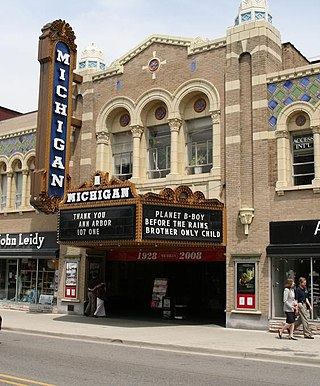
The Michigan Theater is a movie palace in Ann Arbor, Michigan, United States, near the Central Campus of the University of Michigan. It shows independent films and stage productions, and hosts musical concerts.
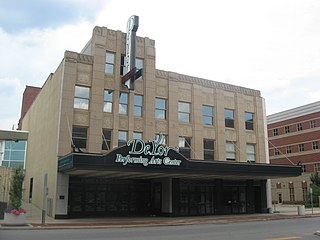
Powers Auditorium, in Youngstown, Ohio is one of the largest auditoriums in the Youngstown-Warren area. The facility is the main venue of downtown Youngstown's DeYor Performing Arts Center. The complex also includes the Adler Art Academy, Beecher Flad Pavilion, and Ford Family Recital Hall. Originally built in 1931 as the Warner Theatre, the former movie palace was renovated and reopened as Powers Auditorium in 1969.

The Coronado Performing Arts Center, in Rockford, Illinois, is a 2,400-seat theatre, designed by architect Frederic J. Klein. The theatre cost $1.5 million to build, and opened on October 9, 1927.

The Arlington Theatre is a historic movie theatre in Santa Barbara, California, United States. Combining the Mission Revival and Spanish Colonial Revival styles of architecture, it the largest movie theater and principal performing arts venue the city. In addition to regular screenings and artists, it is home to many events associated with the annual Santa Barbara International Film Festival.

The Maryland Theatre is a music and entertainment venue located in the Arts and Entertainment District of downtown Hagerstown, Maryland. It was built in 1915, partially destroyed by fire in 1974, reopened in 1978, and expanded into a full performing arts complex in 2019. The theatre's seating capacity is 1,279 people, and it hosts performances of symphony orchestras, country artists, comedians, children's shows, pop stars, recitals, stage shows, and others. Over 81,000 patrons attended performances at the Maryland Theatre in 2005, making it one of Maryland's premier venues for the performing arts. The Maryland Symphony Orchestra performs there regularly and has been headquartered in the building since 2019. The theater features a fully restored Wurlitzer theatre organ.
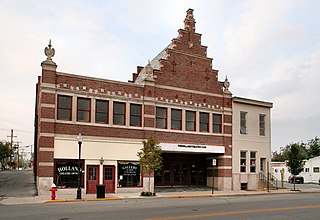
Holland Theatre opened as a vaudeville and movie palace on February 12, 1931 in Bellefontaine, Ohio, United States. Like many historic theaters, the Holland ultimately went out of business after a newer, more technologically advanced, multi-screen cinema was introduced to the town. However, after several renovations to the Holland Theater, it is now fully operational as a performing arts venue for stage performances, and feature films as of 2019.

The Somerville Theatre is an independent movie theater and concert venue in the Davis Square neighborhood of Somerville, Massachusetts, United States. Over one hundred years old, the Somerville Theatre started off as a vaudeville house and movie theater. The theater has since transitioned and now operates as a live music venue and first-run movie theater. As a music venue, the theater has played host to many historic concerts, including the first of the two Last Dispatch concerts, two shows by Bruce Springsteen in 2003, and a performance by U2 in 2009. Recent live performances have included Ryan Adams & the Cardinals, Cursive, Norah Jones, The Jonas Brothers, Joan Baez, and the John Butler Trio.

An atmospheric theatre is a type of movie palace design which was popular in the late 1920s. Atmospheric theatres were designed and decorated to evoke the feeling of a particular time and place for patrons, through the use of projectors, architectural elements and ornamentation that evoked a sense of being outdoors. This was intended to make the patron a more active participant in the setting.
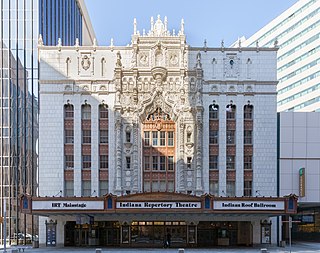
The Indiana Theatre is a multiple use performing arts venue located at 140 W. Washington Street in Indianapolis, Indiana. It was built as a movie palace and ballroom in 1927 and today is the home of the Indiana Repertory Theatre. It was added to the U.S. National Register of Historic Places in 1979. It is located in the Washington Street-Monument Circle Historic District.

The Ramsdell Theatre is a historic playhouse theater building and opera house at 101 Maple Street in downtown Manistee, Michigan. The building was financed by local businessman and politician Thomas Jefferson Ramsdell and was built in 1902. It replaced the town's two previous opera houses which had been destroyed by fire, one in 1882 and the other in 1900. Besides producing plays the facility was later used as a movie theater. James Earl Jones started his acting career at the theater as an actor and stage manager.
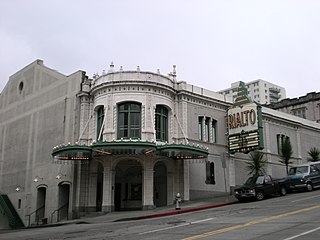
The Rialto Theatre in Tacoma, Washington was built in 1918 to showcase movies. Its design reflects the affluence following World War I. It reflects the character of a palace and is the result of efforts by entrepreneur Henry T. Moore and Tacoma architect Roland E. Borhek. Designed to hold 1500 patrons and retail space. The two-and-a-half-story structure is in the historic downtown of Tacoma. The area has long been associated with theaters and entertainment. The theater is freestanding, with a dramatic view on an incline with a classical façade sheathed of glazed white terra cotta. Both the interior and exterior retain most of the original design of Roland E. Borhek. The theater has an auditorium, proscenium with stage, a relocated projection booth, balcony, lobby, and commercial space. It has been altered with the removal of the storefronts and marquee. On the inside, the lobby's decorative ceiling has been hidden and the concession areas expanded.

The Orpheum Theatre is a historic theater in downtown Wichita, Kansas, United States. It was designed by renowned theatre architect John Eberson with funding from a group of local investors and opened on September 4, 1922.

The Rivoli Theatre in South Fallsburg, New York, United States is located at the intersection of NY 42 and Laurel Avenue. It was built in 1923, renovated in the late 1930s and remains almost intact from that period.

The Majestic Theatre is a performing arts theater in the City Center District of Downtown Dallas. It is the last remnant of Theater Row, the city's historic entertainment center on Elm Street, and is a contributing property in the Harwood Street Historic District. The structure is a Dallas Landmark and is listed on the National Register of Historic Places.

The Mississippi Lofts and Adler Theatre is an apartment building and theater complex located in downtown Davenport, Iowa, United States. It is individually listed on the National Register of Historic Places by its original name, the Hotel Mississippi and RKO Orpheum Theater. The Hotel Mississippi was listed on the Davenport Register of Historic Properties in 2005. In 2020 the complex was included as a contributing property in the Davenport Downtown Commercial Historic District.

The Cascade Theatre is a prominent example of the Art Deco style in Redding, California. The cinema was designed by J. Lloyd Conrich of San Francisco in 1934 for the Naify family, who operated the Golden State Theaters chain of movie theaters in northern California, which later became the United Artists Theaters. The new cinema was built in 1935 by Salih Brothers and opened on August 9 with 1348 seats. It was the first air conditioned public building in Redding. In 1979 the large house was subdivided into four smaller theaters, and in 1997 it closed. The Cascade Theatre reopened in 2004 after it was purchased by Southern Oregon University and the JPR Foundation. The house was restored to its original configuration and it is used as a community auditorium and arts center.

The Grand is a Non-Profit performing arts center on Main Street in Ellsworth, Maine). Built in 1938, it is a significant local example of Art Deco architecture, with a prominent marquee and a stepped steel-and-glass tower. It was listed on the National Register of Historic Places on August 1, 2012.
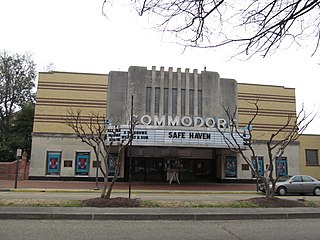
Commodore Theatre is an historic movie theater located at Portsmouth, Virginia. It was built in 1945 in the Streamline Art Deco style, and originally sat 1,000 people. The theater closed in 1975 and sat empty until a change in ownership and extensive renovation beginning in 1987. It reopened two years later, and as of 2023 was in operation displaying first-run films accompanied by a full kitchen.






















